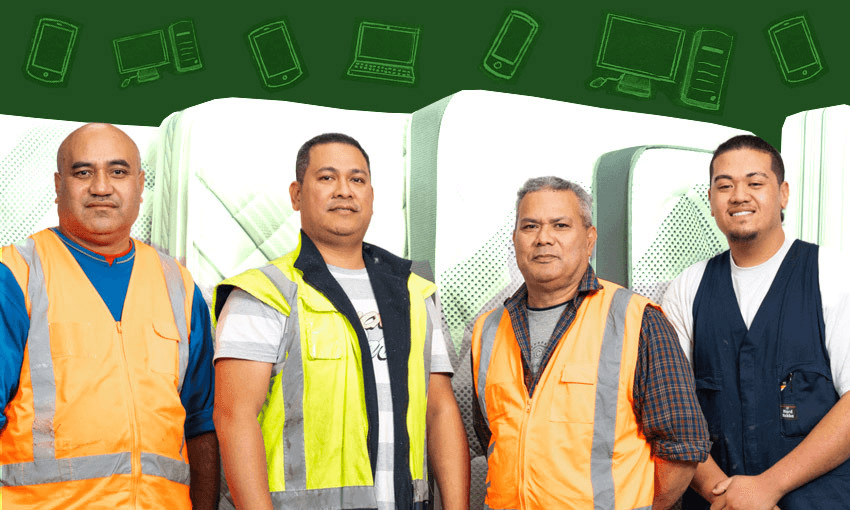A scheme designed to upskill factory workers is not only helping them prepare for the future of work, but also increasing their digital literacy in their everyday lives.
“I’ve been here 18 years – that’s longer than my name,” jokes Maki Ngatokotoru.
Over those years, Ngatokotoru has seen operations at Sleepyhead’s factory in Ōtāhuhu go from rudimentary machines operated by switches to touch screens, large LCDs and sophisticated machines that can shift heavy materials efficiently around the site.
But like many workers at the plant, he’s at risk of being left behind as the factory introduces more automation and digitisation.
And it’s not an issue isolated to those at his factory.
Nearly 60% of Auckland’s hundred thousand-strong Pacific workforce are employed in less-skilled jobs that are vulnerable to the changing technological nature of work.
But Sleepyhead’s owners The Comfort Group are hoping a new scheme will help workers like Ngatokotoru upskill to face the increasing demands of working in hi-tech factories.
Along with 53 other businesses, the company has signed up to an $8 million government-funded programme being delivered by council-controlled organisation Auckland Unlimited, which is part of a wider $22 million programme called the Auckland Pacific Skills Shift.
The initiative provides a range of work-related courses to help Pacific workers in particular affected by the changing nature of work or the impacts of Covid-19.
For Ngatokotoru, the intensive eight-week course focused on digital literacy and involved setting up an email account, learning how to use internet and intranet sites, and what to do to stay safe online.
He says it’s ensured he can communicate better with colleagues about faults and issues that arise and he can also help his wife more at home.
“Don’t get me wrong, I’ve done emails before, but usually my missus does it, so now I’ve learnt how to set up my own email,” he says.
“I’ve never done online shopping or internet banking before and now I’m helping my 8-year-old with googling things for school work.”
He says he will also be signing up for the financial literacy course that’s being offered next.
Fellow Sleepyhead worker Junior Noema admits he had no idea how to use a computer prior to doing the course but since completing it, he says, “it’s giving me confidence at work and it helps me at home too.
“My wife used to do everything online like shopping and banking, but I had a go last week for the first time.”
The Comfort Group’s head of operations, Cameron Turner, used to work in the factory floor and knows how life-changing digital skills could be for many of the company’s veteran employees.
“I worked with a lot of these guys growing up, so it’s incredible to see the journey these guys are on,” he says.
“On any given day we make 300 different types of mattresses – so while we have a factory system, ultimately these guys need to understand the process on a minute-by-minute basis. We need to build up the communication level so we’re all on the same page.”
Comfort Group New Zealand general manager Chris Taylor says while the business would save “significant” money if it shifted manufacturing overseas, they’ve decided to invest further in its New Zealand operation, including a $1 billion plan to create a hi-tech manufacturing facility just out of Huntly.
“We believe we can service our customers and consumers with better-quality products and lead times that can’t be matched by overseas, by being a local producer – but it comes at a cost.
“A key part of that is actually developing our people. The heart and soul of our business is our factory so if we don’t have our people developing, then we don’t have a soul.”
Auckland Unlimited’s general manager of economic development Pam Ford says upskilling factory workers could help unleash the potential of a large section of the Auckland workforce.
“Pacific people will make up a third of the region’s working age population by 2050, so we want to work with Auckland businesses to boost their employees’ resilience … so our companies have a more skilled and future-ready workforce.”
Liki Mata’afa was one of the trainers who delivered the programme at Sleepyhead. Having grown up in South Auckland, he’s seen first-hand how limiting factory work and a lack of digital skills can be. He believes programmes like this will have ripple effects through workers’ families and community networks.
“From working with these guys, I can see that the information I pass on can influence them to make good decisions and good choices, because knowledge is power.”



